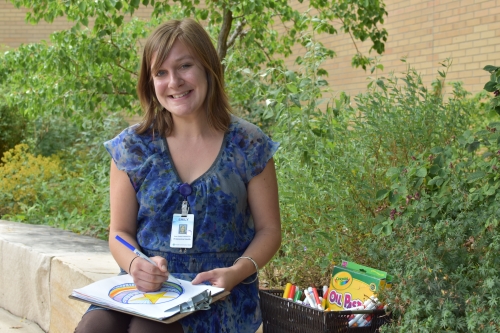Art Therapy Trend Helps BCH Mental Health Patients
- Category: General, About Us, Foundation, Mental Health, Neurology/Neurosurgery, Patients & Visitors, Primary Care
- Posted On:
- Written By: Boulder Community Health
Meet Emily Popiel, a board certified art therapist working with mental health patients at Boulder Community Health’s inpatient behavioral health unit.
She’s part of a trend in the mental health profession – and in popular culture – of using art media and the creative process – coloring, painting with oil or watercolors, modeling with clay, and more – to reduce stress, cope with difficulties and regulate emotions.
“Through the art, patients learn about stress-reduction, self-regulation, healthy coping skills,” Popiel said during an interview. “Creative art therapies are becoming popular in the community and within behavioral health. It’s a great adjunct to talk therapy.”
Adult coloring has recently gained mainstream popularity. Experts say it is a stress-reducing, brain-quieting effect for anyone. But for those experiencing major mental illness or a mental health crisis – art therapy can be a lifeline.
“Patients can explore their thoughts in a non-intrusive way,” Popiel said. “Even emotions and experiences that they're not ready to put words to.”
Through daily art therapy, patients staying at Boulder Community Hospital inpatient behavioral health center are able to have a more individual connection to themselves through their art.
Popiel has been managing the art therapy group and other group therapies at BCH’s inpatient mental health unit since transitioned into this new position in February. Originally from the East Coast, Emily previously worked at Foundations Behavioral Health, in Doylestown PA and the Bronx Psychiatric Center in New York City. A Registered Psychotherapist and Board Certified Art Therapist, she has a master's degree in art therapy from New York University.
Providing art therapy seems to be increasing patient satisfaction, said Popiel, giving patients something playful like art or music to focus on.
“It's fun. Patient’s sometimes don't realize they're learning coping mechanisms. Patients are happy that they are doing something where they have control and can express a bit of themselves,” she said.
Mental health professionals at Boulder Community Health also attribute the new art therapy program to an increase in staff morale.
“It takes some of the stress off caregivers themselves when patients are engaged with their art,” said Jill Eriksen, Boulder Community Health director of nursing for Behavioral Health services.
Rather than replace traditional talk therapy for people experiencing a major psychiatric event, the art therapy assists in quickening recovery and gives patients concrete tools they can use when they go home from the hospital.
“After working in the art for 45-minutes, patients make connections themselves that are valuable to their recovery,” Popiel said, “When I ask, ‘what did the art help you with today?’ patients are able to identify something that is bothering them or perhaps something that led them to their crisis.”
BCH also offers other, traditional inpatient groups, including goal setting, psychoeducation and wellness. The Boulder Community Health inpatient behavioral health unit treats adults with severe mental illness and those experiencing a mental health crisis such as anxiety, depression, or feeing suicidal.
“Art therapy helps by providing coping skills, a way to communicate, stress management and relapse prevention,” Popiel said.
